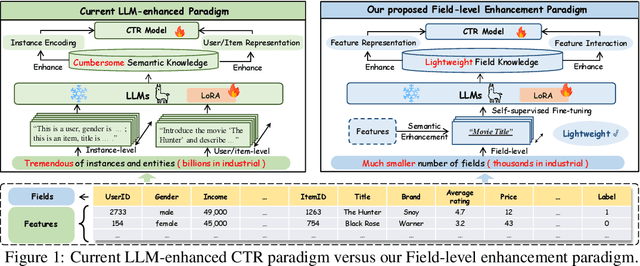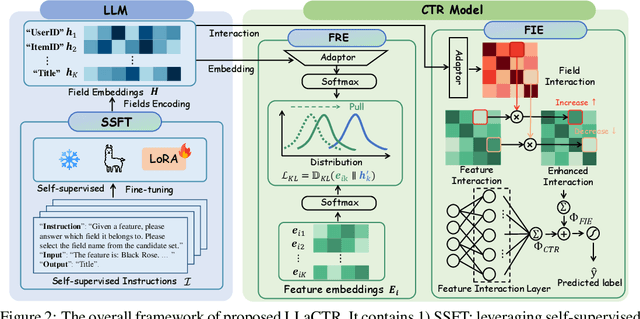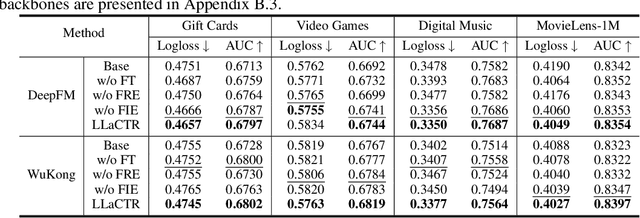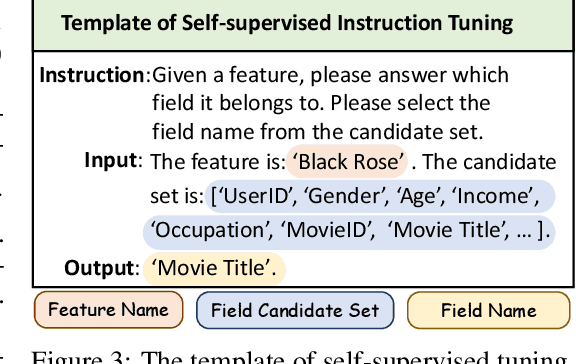Xingyu Lou
Agent-Dice: Disentangling Knowledge Updates via Geometric Consensus for Agent Continual Learning
Jan 08, 2026Abstract:Large Language Model (LLM)-based agents significantly extend the utility of LLMs by interacting with dynamic environments. However, enabling agents to continually learn new tasks without catastrophic forgetting remains a critical challenge, known as the stability-plasticity dilemma. In this work, we argue that this dilemma fundamentally arises from the failure to explicitly distinguish between common knowledge shared across tasks and conflicting knowledge introduced by task-specific interference. To address this, we propose Agent-Dice, a parameter fusion framework based on directional consensus evaluation. Concretely, Agent-Dice disentangles knowledge updates through a two-stage process: geometric consensus filtering to prune conflicting gradients, and curvature-based importance weighting to amplify shared semantics. We provide a rigorous theoretical analysis that establishes the validity of the proposed fusion scheme and offers insight into the origins of the stability-plasticity dilemma. Extensive experiments on GUI agents and tool-use agent domains demonstrate that Agent-Dice exhibits outstanding continual learning performance with minimal computational overhead and parameter updates. The codes are available at https://github.com/Wuzheng02/Agent-Dice.
ColorEcosystem: Powering Personalized, Standardized, and Trustworthy Agentic Service in massive-agent Ecosystem
Oct 27, 2025Abstract:With the rapid development of (multimodal) large language model-based agents, the landscape of agentic service management has evolved from single-agent systems to multi-agent systems, and now to massive-agent ecosystems. Current massive-agent ecosystems face growing challenges, including impersonal service experiences, a lack of standardization, and untrustworthy behavior. To address these issues, we propose ColorEcosystem, a novel blueprint designed to enable personalized, standardized, and trustworthy agentic service at scale. Concretely, ColorEcosystem consists of three key components: agent carrier, agent store, and agent audit. The agent carrier provides personalized service experiences by utilizing user-specific data and creating a digital twin, while the agent store serves as a centralized, standardized platform for managing diverse agentic services. The agent audit, based on the supervision of developer and user activities, ensures the integrity and credibility of both service providers and users. Through the analysis of challenges, transitional forms, and practical considerations, the ColorEcosystem is poised to power personalized, standardized, and trustworthy agentic service across massive-agent ecosystems. Meanwhile, we have also implemented part of ColorEcosystem's functionality, and the relevant code is open-sourced at https://github.com/opas-lab/color-ecosystem.
VeriOS: Query-Driven Proactive Human-Agent-GUI Interaction for Trustworthy OS Agents
Sep 09, 2025Abstract:With the rapid progress of multimodal large language models, operating system (OS) agents become increasingly capable of automating tasks through on-device graphical user interfaces (GUIs). However, most existing OS agents are designed for idealized settings, whereas real-world environments often present untrustworthy conditions. To mitigate risks of over-execution in such scenarios, we propose a query-driven human-agent-GUI interaction framework that enables OS agents to decide when to query humans for more reliable task completion. Built upon this framework, we introduce VeriOS-Agent, a trustworthy OS agent trained with a two-stage learning paradigm that falicitate the decoupling and utilization of meta-knowledge. Concretely, VeriOS-Agent autonomously executes actions in normal conditions while proactively querying humans in untrustworthy scenarios. Experiments show that VeriOS-Agent improves the average step-wise success rate by 20.64\% in untrustworthy scenarios over the state-of-the-art, without compromising normal performance. Analysis highlights VeriOS-Agent's rationality, generalizability, and scalability. The codes, datasets and models are available at https://github.com/Wuzheng02/VeriOS.
Quick on the Uptake: Eliciting Implicit Intents from Human Demonstrations for Personalized Mobile-Use Agents
Aug 12, 2025



Abstract:As multimodal large language models advance rapidly, the automation of mobile tasks has become increasingly feasible through the use of mobile-use agents that mimic human interactions from graphical user interface. To further enhance mobile-use agents, previous studies employ demonstration learning to improve mobile-use agents from human demonstrations. However, these methods focus solely on the explicit intention flows of humans (e.g., step sequences) while neglecting implicit intention flows (e.g., personal preferences), which makes it difficult to construct personalized mobile-use agents. In this work, to evaluate the \textbf{I}ntention \textbf{A}lignment \textbf{R}ate between mobile-use agents and humans, we first collect \textbf{MobileIAR}, a dataset containing human-intent-aligned actions and ground-truth actions. This enables a comprehensive assessment of the agents' understanding of human intent. Then we propose \textbf{IFRAgent}, a framework built upon \textbf{I}ntention \textbf{F}low \textbf{R}ecognition from human demonstrations. IFRAgent analyzes explicit intention flows from human demonstrations to construct a query-level vector library of standard operating procedures (SOP), and analyzes implicit intention flows to build a user-level habit repository. IFRAgent then leverages a SOP extractor combined with retrieval-augmented generation and a query rewriter to generate personalized query and SOP from a raw ambiguous query, enhancing the alignment between mobile-use agents and human intent. Experimental results demonstrate that IFRAgent outperforms baselines by an average of 6.79\% (32.06\% relative improvement) in human intention alignment rate and improves step completion rates by an average of 5.30\% (26.34\% relative improvement). The codes are available at https://github.com/MadeAgents/Quick-on-the-Uptake.
Field Matters: A lightweight LLM-enhanced Method for CTR Prediction
May 20, 2025



Abstract:Click-through rate (CTR) prediction is a fundamental task in modern recommender systems. In recent years, the integration of large language models (LLMs) has been shown to effectively enhance the performance of traditional CTR methods. However, existing LLM-enhanced methods often require extensive processing of detailed textual descriptions for large-scale instances or user/item entities, leading to substantial computational overhead. To address this challenge, this work introduces LLaCTR, a novel and lightweight LLM-enhanced CTR method that employs a field-level enhancement paradigm. Specifically, LLaCTR first utilizes LLMs to distill crucial and lightweight semantic knowledge from small-scale feature fields through self-supervised field-feature fine-tuning. Subsequently, it leverages this field-level semantic knowledge to enhance both feature representation and feature interactions. In our experiments, we integrate LLaCTR with six representative CTR models across four datasets, demonstrating its superior performance in terms of both effectiveness and efficiency compared to existing LLM-enhanced methods. Our code is available at https://anonymous.4open.science/r/LLaCTR-EC46.
MSL: Not All Tokens Are What You Need for Tuning LLM as a Recommender
Apr 05, 2025Abstract:Large language models (LLMs), known for their comprehension capabilities and extensive knowledge, have been increasingly applied to recommendation systems (RS). Given the fundamental gap between the mechanism of LLMs and the requirement of RS, researchers have focused on fine-tuning LLMs with recommendation-specific data to enhance their performance. Language Modeling Loss (LML), originally designed for language generation tasks, is commonly adopted. However, we identify two critical limitations of LML: 1) it exhibits significant divergence from the recommendation objective; 2) it erroneously treats all fictitious item descriptions as negative samples, introducing misleading training signals. To address these limitations, we propose a novel Masked Softmax Loss (MSL) tailored for fine-tuning LLMs on recommendation. MSL improves LML by identifying and masking invalid tokens that could lead to fictitious item descriptions during loss computation. This strategy can effectively avoid the interference from erroneous negative signals and ensure well alignment with the recommendation objective supported by theoretical guarantees. During implementation, we identify a potential challenge related to gradient vanishing of MSL. To overcome this, we further introduce the temperature coefficient and propose an Adaptive Temperature Strategy (ATS) that adaptively adjusts the temperature without requiring extensive hyperparameter tuning. Extensive experiments conducted on four public datasets further validate the effectiveness of MSL, achieving an average improvement of 42.24% in NDCG@10. The code is available at https://github.com/WANGBohaO-jpg/MSL.
TD3: Tucker Decomposition Based Dataset Distillation Method for Sequential Recommendation
Feb 06, 2025



Abstract:In the era of data-centric AI, the focus of recommender systems has shifted from model-centric innovations to data-centric approaches. The success of modern AI models is built on large-scale datasets, but this also results in significant training costs. Dataset distillation has emerged as a key solution, condensing large datasets to accelerate model training while preserving model performance. However, condensing discrete and sequentially correlated user-item interactions, particularly with extensive item sets, presents considerable challenges. This paper introduces \textbf{TD3}, a novel \textbf{T}ucker \textbf{D}ecomposition based \textbf{D}ataset \textbf{D}istillation method within a meta-learning framework, designed for sequential recommendation. TD3 distills a fully expressive \emph{synthetic sequence summary} from original data. To efficiently reduce computational complexity and extract refined latent patterns, Tucker decomposition decouples the summary into four factors: \emph{synthetic user latent factor}, \emph{temporal dynamics latent factor}, \emph{shared item latent factor}, and a \emph{relation core} that models their interconnections. Additionally, a surrogate objective in bi-level optimization is proposed to align feature spaces extracted from models trained on both original data and synthetic sequence summary beyond the na\"ive performance matching approach. In the \emph{inner-loop}, an augmentation technique allows the learner to closely fit the synthetic summary, ensuring an accurate update of it in the \emph{outer-loop}. To accelerate the optimization process and address long dependencies, RaT-BPTT is employed for bi-level optimization. Experiments and analyses on multiple public datasets have confirmed the superiority and cross-architecture generalizability of the proposed designs. Codes are released at https://github.com/USTC-StarTeam/TD3.
Adaptive Conditional Expert Selection Network for Multi-domain Recommendation
Nov 11, 2024Abstract:Mixture-of-Experts (MOE) has recently become the de facto standard in Multi-domain recommendation (MDR) due to its powerful expressive ability. However, such MOE-based method typically employs all experts for each instance, leading to scalability issue and low-discriminability between domains and experts. Furthermore, the design of commonly used domain-specific networks exacerbates the scalability issues. To tackle the problems, We propose a novel method named CESAA consists of Conditional Expert Selection (CES) Module and Adaptive Expert Aggregation (AEA) Module to tackle these challenges. Specifically, CES first combines a sparse gating strategy with domain-shared experts. Then AEA utilizes mutual information loss to strengthen the correlations between experts and specific domains, and significantly improve the distinction between experts. As a result, only domain-shared experts and selected domain-specific experts are activated for each instance, striking a balance between computational efficiency and model performance. Experimental results on both public ranking and industrial retrieval datasets verify the effectiveness of our method in MDR tasks.
LLM4DSR: Leveraing Large Language Model for Denoising Sequential Recommendation
Aug 15, 2024



Abstract:Sequential recommendation systems fundamentally rely on users' historical interaction sequences, which are often contaminated by noisy interactions. Identifying these noisy interactions accurately without additional information is particularly difficult due to the lack of explicit supervisory signals to denote noise. Large Language Models (LLMs), equipped with extensive open knowledge and semantic reasoning abilities, present a promising avenue to bridge this information gap. However, employing LLMs for denoising in sequential recommendation introduces notable challenges: 1) Direct application of pretrained LLMs may not be competent for the denoising task, frequently generating nonsensical responses; 2) Even after fine-tuning, the reliability of LLM outputs remains questionable, especially given the complexity of the task and th inherent hallucinatory issue of LLMs. To tackle these challenges, we propose LLM4DSR, a tailored approach for denoising sequential recommendation using LLMs. We constructed a self-supervised fine-tuning task to activate LLMs' capabilities to identify noisy items and suggest replacements. Furthermore, we developed an uncertainty estimation module that ensures only high-confidence responses are utilized for sequence corrections. Remarkably, LLM4DSR is model-agnostic, allowing the corrected sequences to be flexibly applied across various recommendation models. Extensive experiments validate the superiority of LLM4DSR over existing methods across three datasets and three recommendation backbones.
HMDN: Hierarchical Multi-Distribution Network for Click-Through Rate Prediction
Aug 02, 2024


Abstract:As the recommendation service needs to address increasingly diverse distributions, such as multi-population, multi-scenario, multitarget, and multi-interest, more and more recent works have focused on multi-distribution modeling and achieved great progress. However, most of them only consider modeling in a single multi-distribution manner, ignoring that mixed multi-distributions often coexist and form hierarchical relationships. To address these challenges, we propose a flexible modeling paradigm, named Hierarchical Multi-Distribution Network (HMDN), which efficiently models these hierarchical relationships and can seamlessly integrate with existing multi-distribution methods, such as Mixture of-Experts (MoE) and Dynamic-Weight (DW) models. Specifically, we first design a hierarchical multi-distribution representation refinement module, employing a multi-level residual quantization to obtain fine-grained hierarchical representation. Then, the refined hierarchical representation is integrated into the existing single multi-distribution models, seamlessly expanding them into mixed multi-distribution models. Experimental results on both public and industrial datasets validate the effectiveness and flexibility of HMDN.
 Add to Chrome
Add to Chrome Add to Firefox
Add to Firefox Add to Edge
Add to Edge